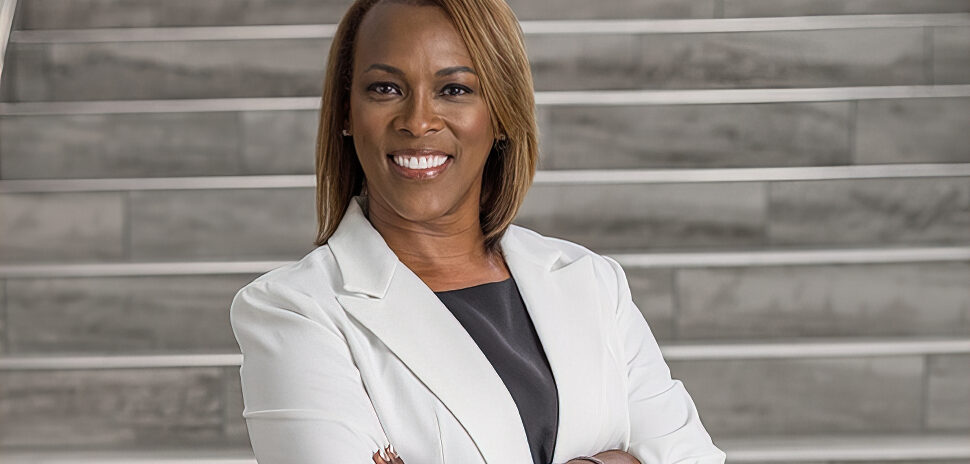As the CEO and co-founder of Kanarys, Mandy Price is leading the charge in creating long-term systemic change around diversity, equity, and inclusion.
In 2019, the Harvard Law School grad left her career as an attorney to launch a DEI tech platform with co-founders, Star Carter and Bennie King. They all attended college together at the University of Texas at Austin, and Price and Carter continued on to law school together and even worked the same law firm after.
Their goal with Kanarys: foster collaboration between companies and employees to strengthen workplace culture and build a more diverse, equitable, and inclusive workforce.
The team developed a platform that uses anonymized data to develop targeted, actionable insights that can assist in diagnosing, prioritizing, and optimizing an organization’s DEI efforts. The interventions are precise, measurable, and long-lasting.
Since its launch, Price and her team have had a landmark few years.
Last year, Kanarys received funding from the Google for Startups Black Founders Fund as part of Google’s commitment to supporting racial equity. The startup was also one of two from Dallas-Fort Worth to be chosen for the inaugural Google for Startups Accelerator: Black Founders Class.
Then, in January 2021, Kanarys closed on a historic $3 million seed round, bringing its total funding to $4.6 million. Price and Carter now are among just 25 Black female founders to have raised at least $4.6 million in venture capital, according to Crunchbase data.
Kanarys is now lauded as the first Black- and female-founded DEI-focused tech company, and the largest DEI data-driven platform of its kind in the U.S.
But what’s on the horizon? Price expects DEI to remain a priority at companies across the U.S., with investments in HR technology to continue. Here are eight predictions she sees on the horizon for the DEI space in 2022—and beyond.
8 DEI trends, written by Mandy Price
1. Neurodiversity will be accounted for in DEI tracking.
As employers continue to prioritize DEI in the new year, they’ll need to broaden the types of diversity they track and measure. One of the least-tracked diversity metrics is neurodiversity, the range of variations in how the human brain operates, like autism spectrum disorders, attention deficit hyperactivity disorder (ADHD), and dyspraxia. According to a recent Bloomberg Law survey, 72% of respondents currently have metrics to track diversity or well-being, and of those 72%, only 17% reported that their organization is tracking neurodiversity. If companies want to have a truly holistic approach to DEI, it’s essential for employers to understand the role both visible and invisible factors, like neurodiversity, play in an employee’s experience in the workplace.
2. Hybrid workplaces will define the new normal.
Research from PWC found that a third of executives (33%) will have a mixed model, with some in-person full-time, some hybrid, and some fully remote. While hybrid models may be beneficial, given the dual benefits of flexibility and collaboration, they can create subtle inequities among employees who are in the office and those that aren’t.
Companies will need to be more intentional about tracking promotions, pay scales, and opportunities between employees that are remote and those in the office in order to uncover any disproportionate effects of being in the office or not. Otherwise, the unfortunate outcome will be disparities among these two groups, and remote employees being penalized for not being in the office.
For example, remote workers may be treated less favorably, miss out on mentorship opportunities, and be less engaged with their team, which could lead to fewer advancement opportunities. Companies will need to make it a priority to keep all employees on equal footing by ensuring there’s inclusion and equity for all employees regardless of whether they work in the office or not.
3. The “Great Resignation” shows no signs of stopping.
In 2021, we saw people leave their jobs in droves in search of more money, more flexibility, and more happiness. According to the Labor Department, a record 4 million people quit their jobs in April alone, and this turnover is not expected to cool down as a record-high 4.4 million people, or 3% of workers, quit their job in September.
Coined the “Great Registration,” the mass exodus has left employers faced with acute labor shortages because workers in a tight labor market have more leverage to move around.
In response, we’ll see employers pressured to offer increased wages, hiring incentives, and competitive benefits to attract talent, and they’ll also focus on internal mobility, reskilling, and upskilling to retain existing employees. We’ll also see organizations prioritize inclusive hiring practices to widen their talent pool.
4. Companies will no longer be able to ignore mental health.
Nine out of 10 employers surveyed by McKinsey reported that the COVID-19 pandemic has negatively affected the behavioral health of their workforce. Although mental challenges were undoubtedly present in the workplace before the pandemic, the consensus among researchers is that these challenges have increased significantly.
In fact, 41 percent of American adults—including 75 percent of Gen Z (18- to 24-year-olds)—surveyed by the US Centers for Disease Control in late June 2020 reported struggling with mental health issues stemming from the pandemic. As employees start to head back into offices and return to a new normal of lingering health anxiety and hybrid working environments, now more than ever ignoring employees’ mental and emotional wellness is simply not an option.
To create an environment that supports mental health, companies need to have appropriate policies in place like appointing a senior leader in charge of mental health initiatives, offering mental health benefits that are on par with physical health benefits, ensuring easy access to resources without stigma, and measuring and meeting the real and current needs of employees.
5. DEI is a priority for younger generations and underrepresented workers.
The future of our workforce places DEI at a much higher priority than previous generations, and a recent survey showed that 83% of Gen Z candidates said that a company’s commitment to diversity and inclusion is important when choosing an employer. And, it’s not just young job seekers—95% of Black Americans also believe it’s important for companies to promote racial equity, according to a Harris Poll survey done with JUST Capital.
If companies want to attract young job seekers, Black, and underrepresented talent, they’ll need to meet this growing need.
6. DEI investment and spending will fuel innovation.
With companies recognizing DEI is a priority for young talent and underrepresented employees, they’ll continue to invest in HR technology that helps them meet their DEI goals. In 2021, we saw a surge in both global spending and funding for HR technology. A Sapient Insights survey reported that 2021 was up 57% over last year on HR spending, and WorkTech’s global VC reporting puts 2021’s year-to-date total nearing $17 billion with December.
This interest in HR technology will drive innovation in the space and define the future of work.
7. Parental leave will take center stage.
The pandemic has brought to light the challenges working parents and caregivers face, and the ongoing conversation around parental and paid family leave was further highlighted this year with Pete Buttigieg being attacked for taking paternity leave and President Biden cutting paid family leave from his social spending plan.
This year, we also experienced the “Shecession,” where the pandemic forced women out of the workforce with nearly three million women dropping out since January 2021. In the next year, we’ll continue to see discussions around parental leave take center stage as workers demand better policies that put families first.
8. DEI pros and consultants want to be data-driven.
Whether it’s the company’s head of DEI or the DEI consultant they hired to conduct workshops, focus groups, and training, all DEI pros want their activities and strategies to be data-driven. A year ago, a one-time generalized training checked the box. Now, C-Suite executives are prioritizing DEI because it has become part of their Environmental, Social, and Corporate (ESG) strategy that is overseen by their board.
In 2022, we’ll see boards play a critical role in providing education, oversight, monitoring, and support for the organization’s DEI strategy, and they’ll continue to request companies be more data-driven when it comes to DEI.
Last year, states like California, New Jersey, and Illinois passed or considered legislation that required public companies to report on or commit to improving diverse leadership, and organizations like Nasdaq started to require companies to report their board diversity. In the new year, we’ll see more diversification of boards as more regulations and reporting will be required for boards.
![]()
Get on the list.
Dallas Innovates, every day.
Sign up to keep your eye on what’s new and next in Dallas-Fort Worth, every day.































